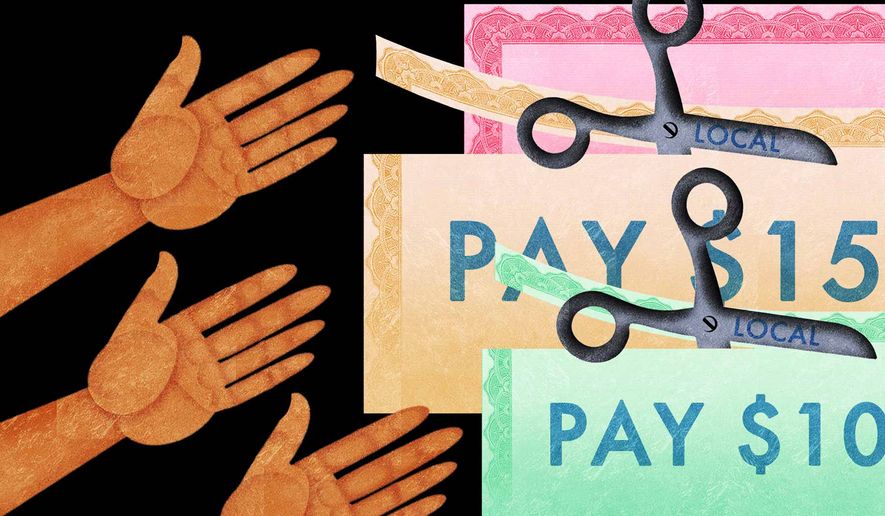OPINION:
Last week, labor union-backed activists protested McDonald’s shareholder meeting in Oak Brook, Illinois. Their demands were familiar: $15 and a union. The protests are part of a combined effort by the labor movement to find relevance by trying to unionize the growing service sector.
While the Service Employees International Union takes the lead in trying to organize fast food restaurants like McDonald’s, the United Food and Commercial Workers Union has long spearheaded the move to organize Wal-Mart, the nation’s largest private employer. Despite years of friendly media coverage, and hundreds of millions of dollars spent (mostly from the forced dues of employees on fixed incomes), the protests have not succeeded in increasing unionization.
The value proposition that unions offer potential members is that they’d be able to negotiate better employee pay than employees could achieve on their own. This view goes largely unchallenged in today’s culture, and declining unionization rates are often pointed to as a factor in the decline of the country’s middle class. But is this view correct or just politically correct?
Consider last week’s agreement between the UFCW and the retail giant Kroger. In a three-year contract that covers 8,500 Indiana employees, the agreed-upon hourly wage rate is $8.50, with a top hourly wage for seasoned employees of $13.90. (These wage rates are before union dues deductions.)
Compare that to Wal-Mart, which the UFCW group OUR Wal-Mart claims exploits employees. Walmart’s starting wage is $9, which quickly increases to $10 after a six month training program. (The starting wage at corporate-owned McDonald’s is also $9.) And its top wage for a cashier in Indiana is $17. Kind of undercuts the argument that unions are needed to negotiate “fair” wages.
Walmart’s competitive pay is one of the reasons why it is a highly sought after place to work. Approximately five million Americans apply to work at Wal-Mart each year, competing for about 500,000 jobs. That makes them about as competitive as getting into one of the country’s top universities.
So who is the winner from unionization contracts like Kroger’s? Crony union bosses, who sell their members the bill of goods that they can negotiate higher pay then pocket the millions of dollars of dues money paid by their members. It’s a scam.
The associated dues windfall is also what’s behind the continued push to unionize fast food and Wal-Mart. If UFCW could succeed in unionizing Walmart’s 1.4 million American employees, they would be looking at a payout of about half a billion dollars a year in new dues money. The few million dollars spent on protests are simply investments for a bigger payout down the line.
Perhaps the starkest example of how crony unions sell out their members for increased dues is the behind-the-scenes deal they cut with Los Angeles city legislators to exempt unions from the city’s recently passed $15 minimum wage. This labor loophole is a naked attempt to sell out members to increase unionization by making it more financially attractive to employers. Unionized employees are hit with a double whammy: They have to pay union dues, and they make less than their private sector counterparts.
Such carve-outs are common, and exist in a dozen California cities alone that have recently raised their minimum wages. The resulting pay differentials can be stark. As a result of a union exemption from Los Angeles’ $15.37 minimum wage for hotel employees, unionized employees at Sheraton Universal Hotel earn $10 an hour, while nonunionized employees at the Hilton next door earn $15.37.
Recognizing they are pawns for their union bosses’ piggy bank, unionized employees should vote to decertify their unions. The Employee Rights Act, pro-employee legislation currently before Congress, would make this much easier to do. One of its eight provisions calls for periodic recertification votes to make sure a majority of the current workforce desires union representation. Less than 10 percent of the country’s unionized workforce actually voted for their union.
More broadly, unions’ continued failure to provide their members with pay packages that can be achieved without them challenge the politically correct narrative that unionization helps increase pay. Check that, it does increase pay — just for union bosses, not employees.
• Richard Berman is the president of Berman and Company, a public affairs firm in Washington, D.C.




Please read our comment policy before commenting.